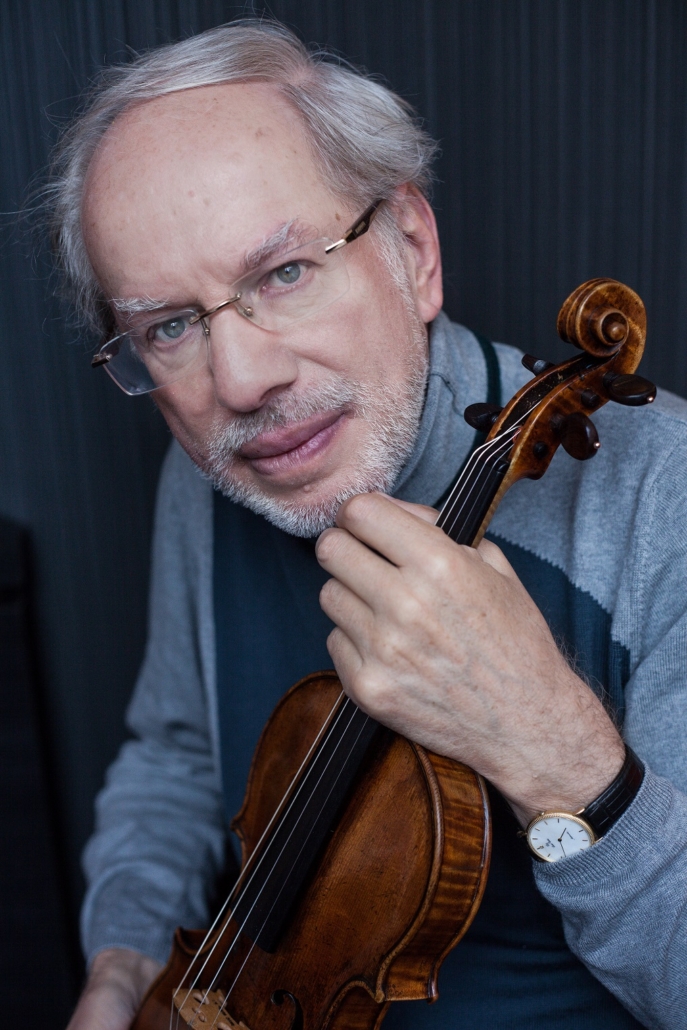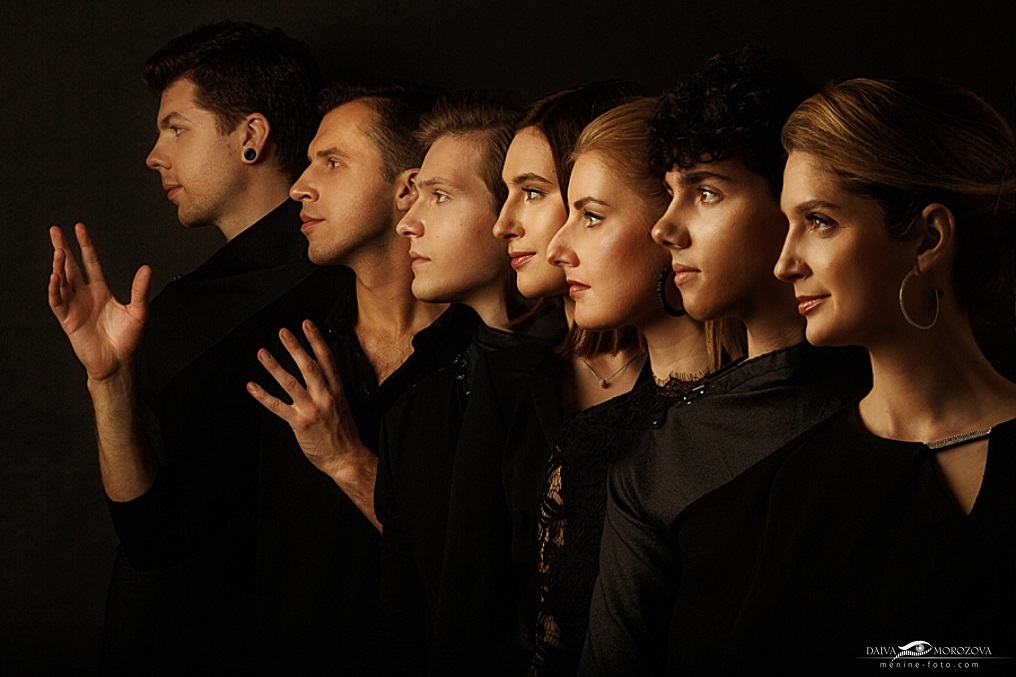Posts
Italian Opera Taormina
2022
Nazarena Theatre (via Fontana Vecchia n. 3) @ 9.15 pm

April > every Saturday
from May to October > every Monday, Wednesday, Friday and Saturday
Do you love Opera music? The artists of the Italian Opera Taormina perform every week in Taormina. One hour and 30 mins of timeless arias from some of the most famous Italian operas.
An extraordinary journey with the most famous arias from great “Italian Operas” interpreted by professional singers who have performed in the most important Italian and international theatres, and accompanied by virtuous pianists:
DON GIOVANNI by W.A. Mozart
LA TRAVIATA by G. Verdi
ELISIR D’AMORE by G. Donizetti
IL BARBIERE DI SIVIGLIA by G. Rossini
MADAMA BUTTERLY by G. Puccini
LA BOHÉME by G. Puccini
TOSCA by G. Puccini
and more….
The event takes place at the Teatro Nazarena (see city map) During the break, a drink is offered on the magnificent panoramic terrace overlooking the bay of the Perla dello Ionio.
TICKETS here
MORE INFO ASAP
www.italianoperataormina.com
WHERE TO STAY
Hotel La Pensione Svizzera – Hotel Villa Schuler – Hotel Villa Ducale – Hotel Villa Carlotta
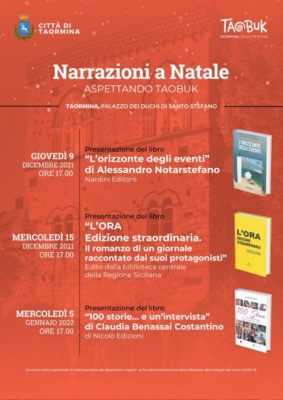
Narrazioni a Natale 2021
TAOBUK presents
Narrazioni a Natale
Aspettando Taobuk
Palazzo Duchi di Santo Stefano, January 5th 2022 @ 5.00pm
Free entrance
Book presentation of “100storie… ed un’intervista” by Claudia Benassai Costantino, Nicolò Edizioni
Works will be held in Italian.
Here the Italian press release.
La città del Centauro, prima ancora di diventare ambita meta estiva dei flussi internazionali, è stata a lungo una delle capitali mondiali del turismo invernale. Taormina può e deve tornare ad esserlo, puntando a destagionalizzare e incrementare l’offerta turistica e culturale, soprattutto durante la lunga vacanza delle festività natalizie e di fine anno. È in questa prospettiva che il Comune guidato dal sindaco Mario Bolognari promuove Narrazioni a Natale. Aspettando Taobuk, il nuovo ciclo di incontri con l’autore, affidandone l’organizzazione al prestigioso festival letterario.In attesa della dodicesima edizione di Taobuk che si svolgerà il prossimo giugno, la rassegna natalizia si terrà nel Palazzo dei Duchi di Santo Stefano. Gli eventi avranno inizio alle ore 17:00 e vedranno l’intervento di scrittori e intellettuali di chiara fama.
Il focus del terzo e ultimo incontro, previsto per il 5 gennaio, sarà sulle insospettabili risorse umane del territorio messinese. Le vite vere narrate dalla giornalista siciliana Claudia Benassai, ogni domenica, dal 2018 ad oggi, sulle pagine della “Gazzetta del Sud”, si sono finalmente trasformate in un libro, 100 storie…e un’intervista, pubblicato dall’editore zancleo Costantino Di Nicolò, che racconta di messinesi che ce l’hanno fatta. Sono storie ordinarie, che a volte diventano straordinarie e raccontano un altro volto della città dello Stretto: quello di una Messina produttiva, che sa farsi strada in Sicilia e nel Mondo.
MORE INFO
Taobuk – info@taobuk.it
New Year’s Concert “Welcome 2022”
by the Taormina Plectrum Orchestra
Ancient Theatre, Sunday 2ndt January 2022 @ 11.30pm
Free entrance but reservation is mandatory
FFP2 Face mask and super green pass (only obtained by those who are vaccinated with two doses or who have recovered from covid) REQUIRED
Music by Verdi, Strauss, Tchaikovsky, Di Capua, Calì, Tosti, Denza, Cannio, De Curtis, Modugno
Tenors: Francesco Cusumano, Alfio Marletta and Simone Massimino
TICKETS > reserve your ticket HERE or by framing the QR code on the manifesto
Type your email address then check your email Inbox. It is possible to book two seats for each email address entered.
The Plectrum Orchestra of Taormina was founded in the early 1900. It consists of over twenty musicians playing mandolins, mandolas, guitars and contrabasses.
Antonio Pellitteri will conduct the Orchestra as usual.
MORE INFO
www.orchestraaplettro.com
www.facebook.com/orchestraaplettrocittaditaormina
 New Year’s Concert
New Year’s Concert
by the Taormina Plectrum Orchestra
Taormina Congress Hall, Saturday 1st January 2022 @ 7.00pm
Free entrance but reservation is mandatory
FFP2 Face mask and super green pass (only obtained by those who are vaccinated with two doses or who have recovered from covid) REQUIRED
Music by Strauss, Tchaikovsky, Bellini, Piazzolla, Scimone
TICKETS > reserve your ticket HERE or by framing the QR code on the manifesto.
Type your email address then check your email Inbox. It is possible to book two seats for each email address entered.
The Plectrum Orchestra of Taormina was founded in the early 1900. It consists of over twenty musicians playing mandolins, mandolas, guitars and contrabasses.
Antonio Pellitteri will conduct the Orchestra as usual.
MORE INFO
www.orchestraaplettro.com
www.facebook.com/orchestraaplettrocittaditaormina
(in update)
2021
JUNE
> 1-21 June – Photo Exhibition – Ex Church Del Carmine
> 10-25 June – Exhibition “La biblioteca araba ed altre scritture” – Palazzo Ciampoli
Saturday 12 June – Emma – Ancient Theatre
> 14-30 June – Exhibition “Le Metamorfosi” – Palazzo Duchi di Santo Stefano
> 17-21 June – TAOBUK, Taormina Book Festival – 11th edition “Le Metamorfosi” – various locations
Saturday 19 – Taobuk Gala Opening – Ancient Theatre (free entrance upon reservation)
Saturday 26 June – Galà Lirico Voci di Sicilia – Ancient Theatre
> 27 June – 3 July – TAORMINA FILM FEST > FULL PROGRAM
Sunday 27 – TaorminaFF67 > Opening Ceremony – Film Screening “BOYS” – Ancient Theatre
Monday 28 – TaorminaFF67 > Film Screening “LA TERRA DEI FIGLI” – Ancient Theatre
Tuesday 29 – TaorminaFF67 > Film Screening “OCCHI BLU” – Ancient Theatre
Wednesday 30 – TaorminaFF67 > Film Screening “PETER RABBIT 2: THE RUNAWAY” – Ancient Theatre
JULY
Thursday 1 – TaorminaFF67 > Film Screening “THE ROSE MAKER” – Ancient Theatre
Friday 2 – TaorminaFF67 > Film Screening “BRONTE” – Ancient Theatre
Saturday 3 – TaorminaFF67 > Closing ceremony and award ceremony of the 67 Taormina Film Fest – Film Screening “SUMMER OF THE SOUL” – Ancient Theatre
Wednesday 14 – Riccardo Muti and the Orchestra Gioviale Cherubini” – Ancient Theatre
>> 16th July /1st August – Exhibition “Anima mundi. Il valore e la forza delle donne” – Ex Chiesa del Carmine
Friday 16 – TAOMODA Gala Evening – Ancient Theatre
>> 17th July / 14th November – Exhibition “Le Cento Sicilie” – Palazzo Ciampoli
Saturday 17 – Francesco De Gregori – Ancient Theatre
Saturday 24 – Giorgio Panariello – Ancient Theatre
>> 25th July / 5th November – Exhibition bu Umberto Mastroianni – Archaeological Area of Naxos and Isola Bella
Wednesday 28 – Mohammad Alshaikh in “Music from Jerusalem, signs of hope” – Ancient Theatre
Wednesday 28 – La Pace seguirà – Odeon Theatre
Thursday 29 – Antonello Venditti – Ancient Theatre
Saturday 29 – La Pace seguirà – Odeon Theatre
Friday 30 – Antonello Venditti – Ancient Theatre
Friday 31 – EMOZIONI, Viaggio tra le canzioni di Battisti e Mogol – Ancient Theatre
AUGUST
>> 16th July /1st August – Exhibition “Anima mundi. Il valore e la forza delle donne” – Ex Chiesa del Carmine
>> 1st August / 14th November – Exhibition “Le Cento Sicilie” – Palazzo Ciampoli
Sunday 1 – Lirica > La Traviata by G. Verdi – Ancient Theatre
Sunday 1 – Concerto per L’Etna – Odeon Theatre
Monday 2 – Concerto per L’Etna – Odeon Theatre
Tuesday 3 – Concert “Racconti di Gioventù” by Giuseppe Sinopoli – Cathedral of Taormina
Wednesday 4 – Les Italiens de l’Opera de Paris – Ancient Theatre
Thursday 5 – Fabrizio Moro – Ancient Theatre
Friday 6 – Diodato – Ancient Theatre
Friday 6 – Nel Ventre – Odeon Theatre
Monday 9 – Gli Imperi della Mente – Odeon Theatre
Tuesday 10 – Hjo Jazz Festival – Ancient Theatre
Tuesday 10 – Gli Imperi della Mente – Odeon Theatre
Wednesday 11 – Rigoletto by Giuseppe Verdi – Ancient Theatre
Friday 13 – Rigoletto by Giuseppe Verdi – Ancient Theatre
Saturday 14 – International Guitar Night – Ancient Theatre to be confirmed
Monday 16 – Le favole di Oscar Wilde – Ancient Theatre
Tuesday 17 – Musa e Getta – Odeon Theatre
Wednesday 18 – Al passo coi Templi – Ancient Theatre
Thursday 19 – La Traviata e La Boheme Recital – Ancient Theatre
Thursday 19 – Ensemble Accademia Erard – Odeon Theatre
Friday 20 – Cavalleria Rusticana and Twelve Years later, the sequel – Ancient Thetre
Saturday 21 – Gianna Nannini – Ancient Theatre
Sunday 22 – Mario Biondi – Ancient Theatre
Tuesday 24 – Taormina Plectrum Orchestra – Public Gardens
Wednesday 25 – Taormina Opera Gala – Ancient Theatre
Friday 27 – Gigi D’Alessio – Ancient Theatre
Friday 27 – Il Fantasma dell’Opera – Odeon Theatre
Saturday 28 – COLAPESCEDIMARTINO – Ancient Theatre
Saturday 28 – Le confessioni di una donna- Odeon Theatre
Sunday 29 – I Tre tenori – Ancient Theatre
Monday 30 – Carl Brave – Ancient Theatre
Tuesday 31 – Lirica > La Traviata by G. Verdi – Ancient Theatre
SEPTEMBER
>> 1st September / 14th November – Exhibition “Le Cento Sicilie” – Palazzo Ciampoli
Thursday 2 – Lo Schiaccianoci 2.0, Reminescence
Friday 3 – Belliniana – Odeon Theatre
September 4-23 – Film Festival “Dolente Immagine” > Casta Diva – Casa del Cinema
Saturday 4 – Mahmood – Ancient Theatre
Sunday 5 – Ermal Meta – Ancient Theatre
Sunday 5 – Film Festival “Dolente Immagine” > Casta Diva – Casa del Cinema
Monday 6 – Film Festival “Dolente Immagine” > projection of “Norma” – Odeon Theatre
Tuesday 7- Film Festival “Dolente Immagine” > projection of “La Straniera” – Odeon Theatre
Thursday 9 – Film Festival “Dolente Immagine” > projection of “La Sonnambula” – Odeon Theatre
Saturday 11- Film Festival “Dolente Immagine” > projection of “Beatrice di Tenda” – Odeon Theatre
Saturday 11 – I Tre Mondi di Me – Ancient Theatre to be confirmed
Sunday 12 – In viaggio con la musica… oltre lo spazio – Ancient Theatre to be confirmed
Sunday 12 – Film Festival “Dolente Immagine” > projection of “I Puritani” – Odeon Theatre
Monday 13 – Enrico Brignano – Ancient Theatre
Tuesday 14 – Madame – Ancient Theatre
Tuesday 14 – Film Festival “Dolente Immagine” > Callas Forever – Odeon Theatre
Wednesday 15 – Sangiovanni – Ancient Theatre
Wednesday 15 – Film Festival “Dolente Immagine” > La Sonnambula – Odeon Theatre
Thursday 16 – Film Festival “Dolente Immagine” > Casta Diva – Odeon Theatre
Friday 17 – Film Festival “Dolente Immagine” > Casa Ricordi – Odeon Theatre
Saturday 18 – Film Festival “Dolente Immagine” > Fitzcarraldo – Odeon Theatre
Sunday 19 – Film Festival “Dolente Immagine” > Maria by Callas – Odeon Theatre
Monday 20 – Zucchero “Sugar” Fornaciari – Ancient Theatre
Tuesday 21 – Zucchero “Sugar” Fornaciari – Ancient Theatre
Tuesday 21 – Film Festival “Dolente Immagine” > Casta Diva – Casa del Cinema, 6.30 pm
Tuesday 21 – Film Festival “Dolente Immagine” > The Divine Spark – Casa del Cinema, 8.30 pm
Wednesday 22 – Film Festival “Dolente Immagine” > Norma (1911 and 2005)
Friday 24 – Taormina Plectrum Orchestra – Public Gardens @7.00 pm. Fee entrance, green pass required
Friday 26 – Alberto Urso – Ancient Theatre > postponed to 2022
Monday 27 – Sting – Ancient Theatre
OCTOBER
>> 1st October / 14th November – Exhibition “Le Cento Sicilie” – Palazzo Ciampoli
NOVEMBER
>> 1-14 November – Exhibition “Le Cento Sicilie” – Palazzo Ciampoli
DECEMBER
Full town program for Christmas
December 4 – January 9 – Exhibition “Venite Adoremus” – Muuseo di Arti e Tradizioni Popolari
December 8 – March 8 – Exhibition “AVVICINàTI AMICI, c’è BUSACCA” – Ex Chiesa Sant’Agostino
December 10 – January 14 – Exhibition “I 100 anni di Turi Ferru” – Casa del Cinema
Saturday 18 – Christmas Concert – Church of Santa Caterina
Tuesday 21 – Christmas Dance – Congress Hall
Thursday 23 – A day with Santa – Piazza IX Aprile
Sunday 26 – Grand Christmas Concert by the Piccolo Coro Città di Taormina – Congress Hall
Sunday 26 – Christmas at the Cinema – “Madres Paralelas” – Casa del Cinema
Sunday 26 – Living nativity, 17° ed. – Trappitello Cancelled due to new Covid restrictions
Monday 27 – Christmas at the Cinema – “Madres Paralelas” – Casa del Cinema
Monday 27 – Living nativity, 17° ed. – Trappitello Cancelled due to new Covid restrictions
Tuesday 28 – Christams Carrols by the Laura Lo Re Trio – Church of Santa Caterina to be confirmed
Tuesday 28 – Christmas at the Cinema – “Madres Paralelas” – Casa del Cinema
Tuesday 28 – Christmas Concert by the Orchestra Mandolinistica Gioviale – Congress Hall
Wednesday 29 – Christmas at the Cinema – “E’ stata la mano di Dio” – Casa del Cinema
Wednesday 29 – Living nativity, 17° ed. – Trappitello Cancelled due to new Covid restrictions
Thursday 30 – Entertainment for kids – Taormina Public Garden Florence Trevelyan
Thursday 30 – Christmas at the Cinema – “E’ stata la mano di Dio” – Casa del Cinema
Thursday 30 – Living nativity, 17° ed. – Trappitello Cancelled due to new Covid restrictions
Thursday 30 – “Natale in Casa Cupiello” a play by Eduardo De filippo (in Italian) – Congress Hall
Friday 31 – THE LADIES, Wish you marry 2022 – Acient Theatre
MORE CHRISTMAS EVENTS IN JANUARY 2022
WHERE TO STAY
Hotel La Pensione Svizzera – Hotel Villa Schuler – Hotel Villa Ducale – Hotel Villa Carlotta

The Brass Group in
“The Ladies. Whish You Marry 2022”
Ancient Theatre, Friday 31st December 2021 @ 11.30am
Free entrance but reservation is mandatory
FFP2 Face mask and super green pass (only obtained by those who are vaccinated with two doses or who have recovered from covid) REQUIRED
TICKETS > reserve your ticket HERE
It is possible to book two seats for each email address entered.
MORE INFO
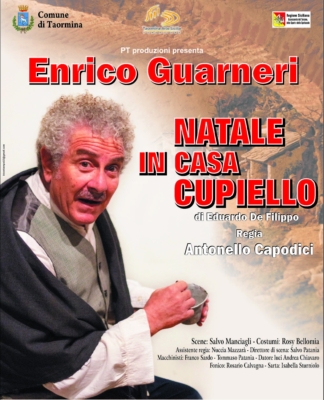
Natale in Casa Cupiello
A Eduardo De Filippo’s play with Enrico Guarnieri
Congress Hall, December 30th 2021 @ 8.30pm
Free entrance but reservation is mandatory
FFP2 Face mask and super green pass (only obtained by those who are vaccinated with two doses or who have recovered from covid) REQUIRED
TICKETS > reserve your ticket HERE
It is possible to book two seats for each email address entered.
Direction: Antonello Capodici
Assistant director: Nuccia Mazzarà
Scenes: Salvo Manciagli
Costumes: Rosy Bellomia
Stage manager: Salvo Patania
Stage technicians: Franco Sardo, Tommaso Patania
Lights: Andrea Chiavaro
Sound technician: Rosario Calvagna
Designer: Isabella Sturniolo
MORE INFO
Fondazione Taormina Arte
www.taoarte.it – www.facebook.com/fondazionetaorminartesicilia
Living Presepe – Living Nativity Scene
… e la Luce brillò… Venite e vedete!
17th edition
From December 26th 2021 to January 9th 2022
Parrocchia Sacro Cuore di Gesù –Trappitello, Taormina (ME)
Free Entrance
Face mask and super green pass required (only obtained by those who are vaccinated with two doses or who have recovered from covid)
During Christmas time in Italy, you are bound to come across cribs in homes and piazzas all over the country. Many cities also have a living crib, or a living nativity scene. It is thought that St. Francis hosted the first living nativity scene in 1223, sparking a tradition that continues in Italy to this day. Beginning on Christmas day, and running until January 6th, towns throughout Italy hold pageants to re-act the night of Jesus’ birth. Actors portray Mary, Joseph, the three Magi and other biblical figures from the gospel.
In Trappitello, peripherical area of Taormina, every year in Chrismas time, a Living Crib with more than 200 “actors” and “walk-ons” is organised. It is one of the most appreciated living cribs of Sicily counting 22.000/25.000 people visiting the event every year.
The location set is the huge garden of the old small church of Santa Venera with impressive old buildings such as an oil mill, a millstone, a mallet and a windmill. While in a secluded and evocative place the Capanna della Natività is located, where the Holy Child is welcomed and warmed by the love of his parents, Maria and Giuseppe, and by a docile ox and a tender donkey.
In fact there are many and various animals “working” as extras in the crib – among which a majestic camel stands out.
On January 6th, according to tradition, the Three Wise Men (the Three Kings) will enter “Bethlehem”, bringing their gifts to Baby Jesus: gold, frankincense and myrrh.
At the exit of the Living Nativity there is the possibility to visit the ancient Church of S. Venera, admire a rich exhibition of Holy Jesus and taste typical products of our tradition.
Opening hours:
– 26 December – 5.00 pm / 8.30 pm
– 27 Dicembre – 6.00 pm / 8.30 pm
– 29 Dicembre – 6.00 pm / 8.30 pm
– 30 Dicembre – 6.00 pm / 8.30 pm
– 1 January – 6.00 pm / 8.30 pm
– 2 January – 5.00 pm / 8.30 pm
– 4 January – 5.00 pm / 8.30 pm
– 5 January – 5.00pm / 8.30 pm
– 6 January – 5.00pm / 8.30 pm
How to get there: Motorway A18 Messina/Catania, exit Taormina, Direction SS. 185 (statal road, blu sign), 500 metres from the motorway exit.
More info: T. +39 0942/50210 – M. +39 339/8320324 and +39 349/4289961 – presepetrappitello@gmail.com
FB: Presepe Vivente di Trappitello
#presepetrappitello
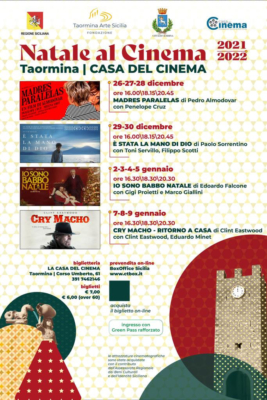
Casa del Cinema Taormina – Christmas 2021
The CASA DEL CINEMA of Taormina presents
Christmas at the Cinema
Casa del Cinema, Corso Umberto 61 Taormina
FFP2 Face mask and super green pass (only obtained by those who are vaccinated with two doses or who have recovered from covid) REQUIRED
TICKETS on boxol.it (type “Taormina” on the search bar)
€ 7,00 (over 60 > € 6,00)
26-27-28 December 2021

Madres paralelas
@ 4.00pm / 6.15pm / 8.45pm
MADRES PALALERAS by Pedro Almodovar
with Penelope Cruz
Trailer: https://www.youtube.com/watch?v=GvFxtKCFtHE
29-30 December 2021
@ 4.00pm / 6.15pm / 8.45pm
E’ STATA LA MANO DI DIO by Paolo Sorrentino
with Toni Servillo and Filippo Scotti
2-3-4-5 January 2022
@ 4.30pm / 6.30pm / 8.30pm
IO SONO BABBO NATALE by Edoardo Falcone
with Gigi Proietti e Marco Giallini
7-8-9 January 2022
@ 4.30pm / 6.30pm / 8.30pm
CRY MACHO – RITORNO A CASA by Clint Eastwood
with Clint Eastwood, Eduardo Minet
MORE INFO
Casa del Cinema – www.taormina-arte.com – Mob. 0039 391 7462146



